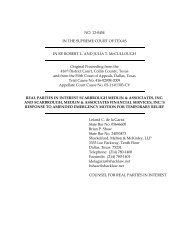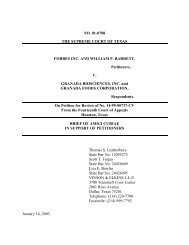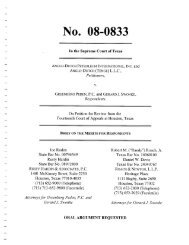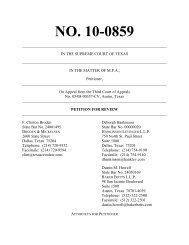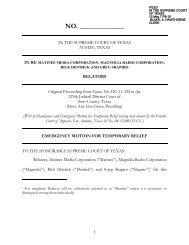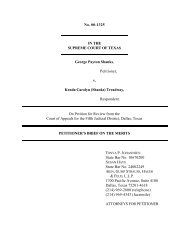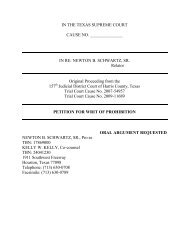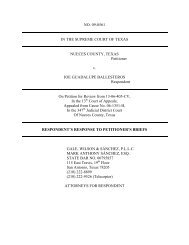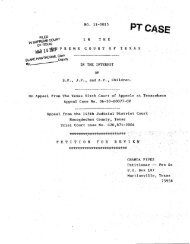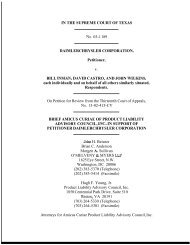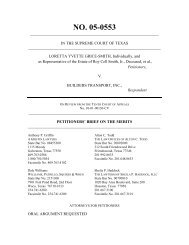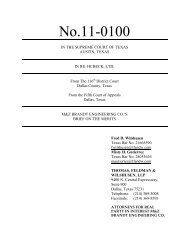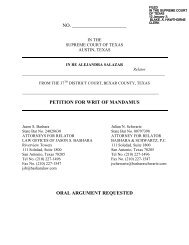Petition for Writ of Mandamus - Filed - Supreme Court of Texas
Petition for Writ of Mandamus - Filed - Supreme Court of Texas
Petition for Writ of Mandamus - Filed - Supreme Court of Texas
You also want an ePaper? Increase the reach of your titles
YUMPU automatically turns print PDFs into web optimized ePapers that Google loves.
stocks, bonds, futures contracts, patents, copyrights,<br />
licenses, trademarks, franchises, goodwill and general<br />
receivable rights.<br />
• receipts from the sale <strong>of</strong> securities are apportioned based<br />
on the location <strong>of</strong> the payor. If securities are sold through<br />
an exchange, and the buyer cannot be identified, then<br />
7.9% <strong>of</strong> the revenue is a <strong>Texas</strong> receipt;<br />
• membership or enrollment fees paid <strong>for</strong> access to benefits<br />
are considered gross receipts from the sale <strong>of</strong> an<br />
intangible asset and will be a <strong>Texas</strong> gross receipt if the<br />
payor is legally domiciled in <strong>Texas</strong>;<br />
• receipts from the servicing <strong>of</strong> loans secured by real<br />
property are <strong>Texas</strong> gross receipts if the real property is<br />
located in <strong>Texas</strong>; and<br />
• the pro rata share <strong>of</strong> net income from a passive entity if<br />
the passive entity's principal place <strong>of</strong> business is in <strong>Texas</strong>.<br />
Any item <strong>of</strong> revenue that is excluded from total revenue<br />
under <strong>Texas</strong> law or United States law is not included in <strong>Texas</strong><br />
gross receipts or gross receipts everywhere. For example,<br />
a taxable entity should not include in <strong>Texas</strong> gross receipts:<br />
• income excluded because <strong>of</strong> IRC Sections 78 or 951-964;<br />
• dividends and/or interest received from federal<br />
obligations; or<br />
• dividends <strong>for</strong> which a deduction is allowed on Schedule<br />
C, Form 1120.<br />
In addition, a taxable entity that is a combined group should<br />
not include in <strong>Texas</strong> gross receipts any revenues generated<br />
by a member <strong>of</strong> the group that is organized outside <strong>of</strong> <strong>Texas</strong><br />
and that does not have nexus in <strong>Texas</strong>. However, <strong>Texas</strong><br />
gross receipts will include certain sales <strong>of</strong> tangible personal<br />
property made to third party purchasers if the tangible<br />
personal property is ultimately delivered to a purchaser in<br />
<strong>Texas</strong> without substantial modification. For example, drop<br />
shipments made by a member <strong>of</strong> a combined group from a<br />
<strong>Texas</strong> location to a <strong>Texas</strong> purchaser would be included in<br />
<strong>Texas</strong> receipts based on the amount billed to the third party<br />
purchaser if the seller is also a member <strong>of</strong> the combined<br />
group and the seller does not have nexus.<br />
Banking Corporations and Savings & Loan Associations<br />
Dividends and interest received by a banking corporation or<br />
savings and loan association are <strong>Texas</strong> receipts if they are<br />
paid by a corporation incorporated in <strong>Texas</strong> or if they are<br />
paid by an entity or person legally domiciled in <strong>Texas</strong>. A<br />
banking corporation should exclude from its <strong>Texas</strong> receipts<br />
interest earned on federal funds and interest earned on<br />
securities sold under an agreement to repurchase that are<br />
held in a correspondent bank domiciled in <strong>Texas</strong>.<br />
Item 24. Gross receipts everywhere<br />
Any amounts not included in total revenue (Item 10) must<br />
not be included in computing gross receipts everywhere.<br />
There<strong>for</strong>e, gross receipts everywhere should equal the<br />
amount reported in Item 10 unless the taxable entity is a<br />
health care provider, health care institution, law firm, lending<br />
institution or security broker dealer.<br />
Health care providers and health care institutions must add<br />
back the cost <strong>of</strong> uncompensated care when computing<br />
18<br />
gross receipts everywhere. Law firms must add back<br />
amounts related to pro bono cases when computing gross<br />
receipts everywhere.<br />
In accordance with <strong>Texas</strong> Tax Code Sections 171.106(f)<br />
and (f-1), qualified lending institutions and security broker/<br />
dealers may use the gross sales price <strong>of</strong> securities or loans<br />
sold instead <strong>of</strong> the net gain/loss on the sale in computing<br />
gross receipts everywhere.<br />
Gross receipts everywhere include:<br />
• all sales <strong>of</strong> tangible personal property;<br />
• all rentals;<br />
• all services;<br />
• all royalties;<br />
• all other business receipts;<br />
• all dividends and interest; and<br />
• the net gain/loss from the sales <strong>of</strong> investments or capital<br />
assets.<br />
A capital asset is any asset, other than an investment, which<br />
is held <strong>for</strong> use in the production <strong>of</strong> income, and is subject to<br />
depreciation, depletion or amortization. An investment is<br />
any non-cash asset not a capital asset.<br />
Item 25. Apportionment factor<br />
If <strong>Texas</strong> gross receipts in Item 23 are zero, enter zero. If<br />
Item 23 and Item 24 are the same and greater than zero,<br />
enter 1.0000. If Item 23 is more than Item 24 and both are<br />
greater than zero, enter 1.0000. Otherwise, divide Item 23<br />
by Item 24 and round to 4 places past the decimal.<br />
Item 26. Apportioned margin<br />
Multiply Item 22 by Item 25. If less than zero, enter zero.<br />
Item 27. Allowable deductions<br />
Each <strong>of</strong> the following deductions may be subtracted from<br />
apportioned margin:<br />
• A taxable entity may deduct 10% <strong>of</strong> the amortized cost <strong>of</strong><br />
a solar energy device if the device meets the criteria in<br />
Sec. 171.107(b), Tax Code. The deduction may not<br />
reduce apportioned margin below zero, and no carryover<br />
<strong>of</strong> unused deductions is allowed.<br />
• A taxable entity may deduct 10% <strong>of</strong> the amortized cost <strong>of</strong><br />
equipment used in a clean coal project if the equipment<br />
meets the criteria in Sec. 171.108(b), Tax Code. The<br />
deduction may not reduce apportioned margin below zero,<br />
and no carryover <strong>of</strong> unused deductions is allowed.<br />
Item 28. Taxable margin<br />
Item 26 minus Item 27.<br />
Item 29. Tax rate<br />
Enter the appropriate tax rate:<br />
• 0.01 (1.0%) <strong>for</strong> most entities<br />
• 0.005 (0.5%) <strong>for</strong> qualifying wholesalers and retailers<br />
(see Tax Rates, page 3)<br />
Note: If the SIC code on Form 05-158-A does not fit the definition<br />
<strong>of</strong> qualifying retailers and wholesalers on page 3, the 0.5%<br />
tax rate will be denied when the report is processed.



